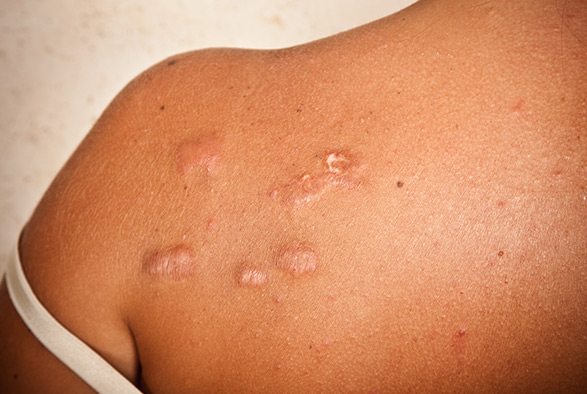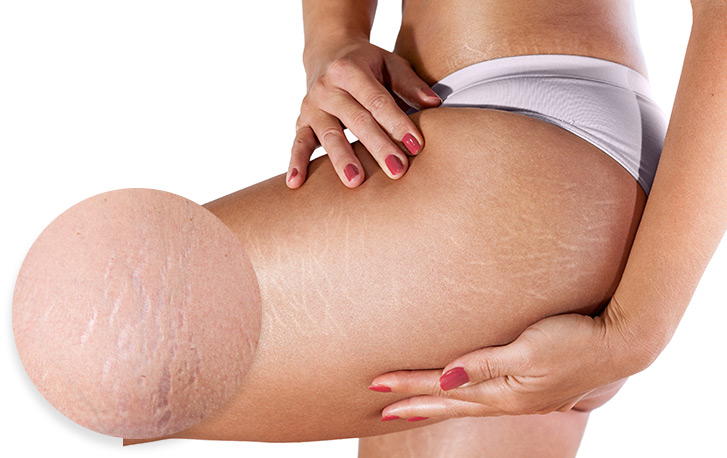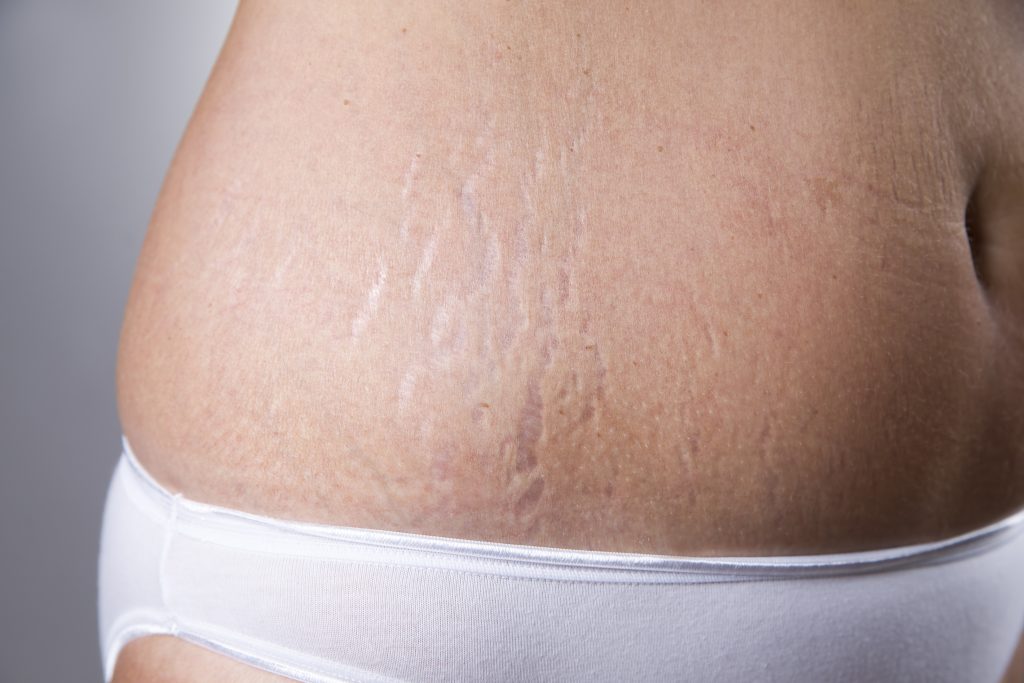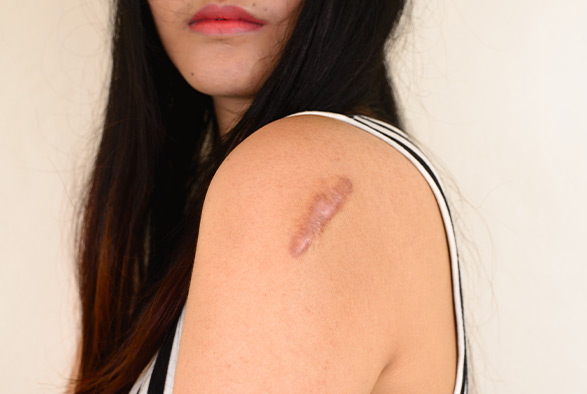Advanced Scar Treatment Options
What is a scar?
Did you know that scars are a natural part of the healing process? Small wounds that only affect the top layer of skin tissue often will heal without a scar. Scar tissue often forms as medium to larger wounds heal to cover the injured area, but this tissue is not as strong as normal tissue. Scar tissue forms a pattern of fibers straight across instead of the crosshatched pattern of normal skin tissue. Over time, blood vessels will form again and the skin tone will even out. The appearance of the scar tissue may change but the scar tissue itself is permanent.
Scars can look different depending on the kind of wound, its severity, as well as the individual’s genetics and ability to heal. Some scars will cause problems with movement if they are large and form around a joint but usually a scar will not cause any medical problems. The main complaint most people have with scars is that they are unsightly and detract from the appearance they would like to have. Those who have had severe acne often have scars even after the acne problem has been resolved.


What about stretch marks?
Although most people don’t consider them to be scars, stretch marks are a kind of scarring. They usually occur when the skin is pulled further than it is able to expand. This tears the tissue and can leave white or red marks, which are actually scars deeper in the skin. Stretch marks are common in women who are pregnant and sometimes in athletes or body builders. They often will occur at times of dramatic hormonal change.
Can you get rid of scars?
For a while there was no effective solution for reducing the appearance of scars. Many creams have been brought to market that claim to remove scars with repeated use. None of them have been proven to be very effective. A cream may help with skin discoloration from acne but for scarring it is unlikely to produce any results.
In the 1980s, dermatologists like Dr. Joshua Fox at Advanced Dermatology, P.C. discovered that the lasers they were using to treat certain skin conditions could also reduce the appearance of scarring. Dr. Fox pioneered the use of lasers to treat stretch marks and was featured in various media segments telling people about what was then an exciting new treatment option for scars.
Now, lasers used in dermatology offices to treat scarring are prevalent and there are many different models being used. (Advanced Dermatology, P.C. has the most lasers on Long Island!) Lasers treat scars by targeting the particular pigment in the skin as well as resurfacing the skin. A raised or “hypertrophic” scar can be resurfaced to become more level with the surrounding tissue. At Advanced Dermatology, P.C. we often use a CO2 laser like Pixel to accomplish this. A laser can also target particular pigments in the skin to even out skin tone and reduce inflammation. We use a laser like an ND:yag or GentleLase to diminish blood vessels that cause inflammation and reduce the appearance of scars.


Acne Scars
When it comes to treating acne scars it is most important that the acne is treated first. While breakouts are still occurring there is a continued potential for scarring. There are many treatments available at Advanced Dermatology, P.C. to treat acne and you can work with one of our board-certified dermatologists or physician assistants to get rid of acne and keep breakouts under control. Once that is accomplished you can focus on cleaning up the pigmentation and scarring. Chemical peels can sometimes help with the hyperpigmentation that may appear after acne lesions have healed. A chemical peel is applied to the skin then peeled off to remove the top layer of the skin. Lasers like Fraxel can also help resurface the skin to diminish the appearance of acne scars and help with any discoloration left from acne.
Deeper, Pitted Scars
Cystic acne often will leave pitted scars that make depressions in the skin. This can also happen with certain kinds of wounds. Laser resurfacing can sometimes help by smoothing out the edges of these scars to make them less visible. Another option if the scars are deep is to use an injectable filler like Juvederm, which will raise the surface of the depression to be level with surrounding tissue.
Keloid scars
Keloid scars are different than other scars because they continue to grow outside of the injured area. If you try to cut off a keloid scar without further treatment it will continue to grow. The only way to stop a keloid scar from growing is to stunt the growth of the cells that form the scar. This can be accomplished by freezing off the keloid with cryotherapy treatments. Cryotherapy both freezes the scar off and stops growth. Keloids are now also treated at Advanced Dermatology, P.C. using SRT-100 skin radiotherapy. With this treatment the keloid is first cut off, then radiotherapy is used to stop the growth of the scar tissue. Our doctors have seen great success with both cryotherapy and superficial radiotherapy and recurrence rates of keloids can be reduced dramatically.
Expectations for scar treatment
Patients should expect an improvement but not a total removal of their scars. In most cases scar tissue can not be removed completely. We do see excellent results in many patients however, and the appearance of scarring can be reduced dramatically with treatments done by an experienced dermatologist. Many scar treatments will require multiple visits to obtain the best results with time between treatments for healing. Your dermatologist will work with you to determine the best combination of treatments to reduce your scars.


Where can you get scar treatments?
Advanced Dermatology, P.C. has many experienced, board-certified dermatologists who can help you with your scars. Dr. Joshua Fox, medical director of the practice, pioneered the use of lasers to treat scars and we have dermatologists who have been using lasers for scar treatment for many years. Advanced Dermatology, P.C. has offices in Queens, Long Island, Manhattan, Brooklyn, and Westchester in New York and Ridgewood and Summit in New Jersey. The offices have appointment times to fit your schedule including early morning and evenings.
Frequently Asked Questions
What is the best way to get rid of acne?
Treating acne is case-specific, with different people responding distinctly to the same medications and treatment plans. Because each patient has his or her own set of sensitivities, figuring out which acne treatment works best for you may be through trial-and-error. There is no “best” solution or one-size-fits-all treatment. At Advanced Dermatology, with multiple locations in New York and New Jersey, our skin care experts will assess the root cause of your acne. Whether your acne is triggered by hormonal changes or imbalances, lifestyle, skin type, or medication, our highly trained dermatologists will help you understand the cause and suggest an effective treatment plan.
Is there anything I can do to prevent acne?
Though acne is not always preventable (it is often genetic), the following are some at-home tips for patients suffering from acne:
- Wash your face with a gentle cleanser in the morning, at night, and anytime you feel sweaty. Be gentle with your skin, as scrubbing too hard can cause irritation.
- Try not to touch your face. Your hands carry countless germs and touching your acne will undoubtedly worsen it. Resist the urge to pick at or pop your pimples.
- Change your pillowcases and sheets more often to prevent the accumulation of dead skin cells and dirt that can occur in bedding.
Why choose Advanced Dermatology?
At Advanced Dermatology, we understand that waiting for acne to clear can be frustrating, and that patients want immediate results so as to start living their lives free of the insecurities that accompany facial acne. Our teams of experienced dermatologists and specialized physician assistants in New York and New Jersey have extensive experience and will work with you until they find a solution that is effective. With 35 locations across Long Island, Manhattan, Brooklyn and Queens, we are always close by. We offer personalized acne care regimens to give you long-lasting results. Make an appointment at one of our convenient NY or NJ locations and start feeling confident about your skin.
